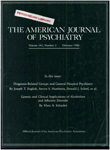Psychiatric components of medical and surgical practice, II: Referral and treatment of psychiatric disorders
Abstract
In response to a questionnaire regarding the frequency and type of psychiatric disorders among their patients, internists and surgeons in private practice estimated that 21.1% of their patients had psychiatric problems, that 14.6% would benefit from psychiatric treatment, and that they spent an average of 17.3% of their time treating psychiatric problems. They also stated that depression was the most frequent psychiatric disorder among their patients. More than half of the internists indicated they would treat depression, anxiety attacks, psychosomatic disorders, and organic brain disorders, which may be one explanation for the observation that more medical and surgical patients have psychiatric disorders than are referred to a psychiatrist.
Access content
To read the fulltext, please use one of the options below to sign in or purchase access.- Personal login
- Institutional Login
- Sign in via OpenAthens
- Register for access
-
Please login/register if you wish to pair your device and check access availability.
Not a subscriber?
PsychiatryOnline subscription options offer access to the DSM-5 library, books, journals, CME, and patient resources. This all-in-one virtual library provides psychiatrists and mental health professionals with key resources for diagnosis, treatment, research, and professional development.
Need more help? PsychiatryOnline Customer Service may be reached by emailing [email protected] or by calling 800-368-5777 (in the U.S.) or 703-907-7322 (outside the U.S.).



